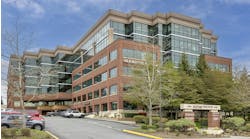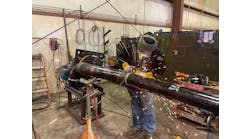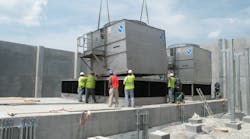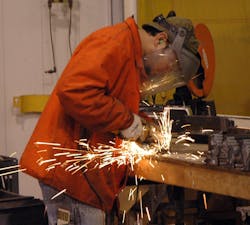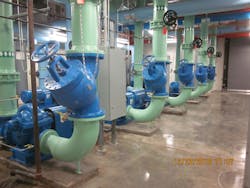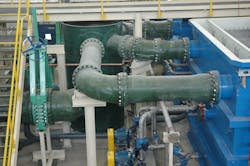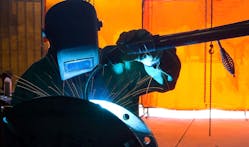HOW ARE ECONOMIC conditions in 2013 for the nation’s major mechanical contractors? It’s difficult to say because it depends on the specific market in which a contractor is working.
To download a pdf of our complete coverage, click here.
Don Yerks from Dunbar Mechanical says the industrial sector in northwest Ohio has slowed, while Brian Harris of Amex Nooter in Hammond, Ind., is finding good work in refineries, steel mills, chemical plants, air and gas plants, and power plants in northwest Indiana. Greg Hosch, president of Harris Co. in St. Paul is seeing a dip in healthcare revenues in the Twin Cities as hospital construction finishes up, but Warren Hill, Hill Mechanical Group, notes that high profile healthcare projects are still going on in Chicago.
Tony Guzzi, president of EMCOR Group says it best when he says we are in the muddle.
“There’s all kind of conflicting information,” Guzzi says. “We’re in the muddle. We’ve been in the muddle for quite a while and we’ve been trying to ignore the muddle and take care of what we can control. We’ve moved from a period of economic uncertainty to a period of political uncertainty that we’ll be in until we clear up this fiscal mess, get a budget deal, and clear up our energy policy with the Keystone pipeline. We have an opportunity with the inexpensive natural gas that we have, but we can’t take advantage of it politically. If we can do that, we could get the economy going again. People are tired of being tired. It’s as simple as getting a fiscal deal and getting certainty on spending and taxes, then getting approval of the Keystone pipeline and then we can get moving again.”
Diversity is a necessity
Guzzi predicts that 2013 will be up 3%-6% and, based on interviews for this story, that’s as good a number as any. The contractors are not losing money. If a market is too brutal — high-rise residential, for example — they just won’t bid it. Commercial contractors have had an unpleasant four or five years. To make any money, large mechanicals have to be diverse and capable of performing industrial work, food processing, oil and gas, high-end data centers and healthcare. That keeps out the riff-raff.
The energy efficiency market in commercial buildings should be stronger than it is, Guzzi, points out, because many of them are running 25-year-old equipment that’s so inefficient that you can get two-year payback. Unfortunately, first cost dominates unless the building is owner-occupied or the occupant knows he will be in the building longer than 10 years. One of the biggest impediments to the energy efficiency market is the triple net lease because the owner won’t improve anything until the building becomes uncompetitive because the tenant pays for everything.
Oil and gas will be good, Guzzi says, industrial in general will be strong, and eventually power will be strong on the natural gas generation side. Healthcare, he notes, is episodic: if you win the job, you think the healthcare market is strong, if you don’t, you think it’s weak.
Commercial is coming back but it should be coming back faster for a couple reasons. First, we didn’t overbuild the last time. Second, there’s a lot of obsolete inventory out there that was built with a 30- to 35-year lifespan. These buildings are inefficient and not conducive to the way we work today.
Food processing is strong across the country, especially in the Midwest and the mountain states. The high-tech market is good in California, Oregon and Arizona. If they build everything in New York that they claim they’re going to build, it’s going to get busy. America’s reindustrialization is taking place in the Southeast and Gulf Coast.
A waiting game
Meanwhile in northwest Ohio, Don Yerks, director of marketing for Dunbar Mechanical and a veritable Mr. Sunshine in 2012, is more subdued.
“It’s not near as good as we expected it to be,” Yerks says. “A year ago when we talked, there were a lot of projects coming. Most of them, we are told, are still coming but they are not here yet, so things have been delayed, things that we were told had quick timetables are not so quick. We’re finding customers to be more cautious in the capital improvement process than we expected them to be. In the second half of the year, a lot of customers became more cautious because they didn’t see the recovery happening as fast as they thought it would.”
The problem, Yerks said, was in the first-, second- and third-tier automotive suppliers. As Detroit has made its comeback, the automakers are investing in plants and equipment. Their suppliers were expected to follow suit, but they have not.
The other head-scratcher in eastern Ohio and western Pennsylvania is the lack of construction from hydraulic fracturing for natural gas. Mechanical contractors rightly expected work from stripping and cracking plants and compressor stations but that hasn’t happened. Royal Dutch Shell optioned a large parcel of land in western Pennsylvania, Yerks notes, but the land is still standing vacant.
Where opportunity exists
In the Chicago area, Hill Mechanical Group’s total dedication to BIM has helped it win complicated work, especially data centers, says Warren Hill P.E., president. Hill Mechanical performs HVAC, plumbing and fire protection in data centers, which are booming in the Chicago market. Hill notes that the application of heat wheels to recover some of the massive amounts of space conditioning in data centers is a major trend.
Despite completion of significant hospital projects in Chicago, such as the new Rush University Medical Center and the Ann & Robert H. Lurie Children’s Hospital, hospital construction is still strong with a new tower under construction at Christ Hospital in Oak Lawn, Ill., and a completely new hospital for the Rehabilitation Institute of Chicago.
“Higher education got the news about science being important and they’ve built more science buildings than I can click off,” Hill says. His firm has built science buildings for DePaul University, Lewis University, Wheaton College, and Loyola University. It’s built a molecular engineering building at the University of Chicago, and it’s currently working on a project at North Park College in Chicago.
In the center of the country, Bill McDermott, CEO of MMC Corp. in Overland Park, Kan., says, “As a whole, we are seeing that multifamily, student housing, senior housing, mission critical, and healthcare are strong markets right now and have been successful in those markets. On the flip side, projects funded by the government have been slower than in the past.”
But while the Feds may have slowed down their spending, local governments have not, McDermott notes.
“We’re seeing activity in the education field and infrastructure, such as water and wastewater,” says McDermott. “In fact, our MW Builders general contracting brand has seen a lot of activity in the K-12 market, especially in Texas. In addition, our mechanical contractor, MMC Contractors, has secured multiple wastewater projects in the Midwest.”
Like Hill Mechanical, MMC has won plenty of hospital business. While construction of massive hospitals — more than 250,000-sq.ft. — has slowed, McDermott says there is still plenty of opportunity in construction of smaller hospitals and in renovation work.
Harris Mechanical, a $220 million institutional/industrial contractor headquartered in St. Paul, Minn., is performing piping work at two utility scale concentrating solar power plants in Mohave, Calif., and Gila Bend, Ariz., says President Greg Hosch.
“It’s a huge project,” Hosch says of the Gila Bend project that’s about 80% done. “They let a package here and a package there. It’s all piping, everything from water treatment to water lines to hot oil lines and piping around the turbine block. A good chunk of it is heavy-wall X-Ray-quality type product, 90% of it is welded. A vast majority of our hours there are in welded pipe.”
Like his peers, Hosch says that state and local governments still have money. Harris Cos. has performed institutional work at the University of Minnesota; a current large project is a nano-technology building, and the university has more construction coming down the line. The firm has worked at the University of California at Berkeley, and the University of Iowa has huge projects underway, Hosch says.
In the Twin Cities, Harris Cos. is performing staged and planned upgrades to an existing water treatment plant that the contractor installed eight to 10 years ago. That’s $17-$18 million project.
Harris also gets called in on projects that Hosch characterizes as messy, complicated, difficult and requiring a contractor with plenty of engineering expertise, such as garbage gasification or anaerobic digesters or a battery recycling plant or windmills.
While hospital construction in the Twin Cities has slowed, Hosch notes, the economic engine of Rochester, Minn., the Mayo Clinic, is planning to spend $3.5 billion on capital projects at a pace of $700 million a year.
Like MMC, Ivey Mechanical, Kosciusko, Miss., has seen Federal work slow down.
“We have seen the biggest decrease in government work, primarily military,” says Denny Terrell, Ivey’s president. “Most other markets have seemed to have bottomed out and slightly begun to rebound. But we are still so far away from where things were before 2008 that it is hard to tell there has been much of a recovery. I see government work continuing to be extremely slow with the government spending halt. Most other markets seem to be slowly moving in a positive direction.”
Ivey has seen manufacturing make a significant comeback in the Southeast and it now makes up the largest percentage of the firm’s backlog. Previously, healthcare and government work had dominated Ivey’s backlog. Healthcare has slowed in Ivey’s market, Terrell says, while institutional projects such as college dormitories also are doing well.
